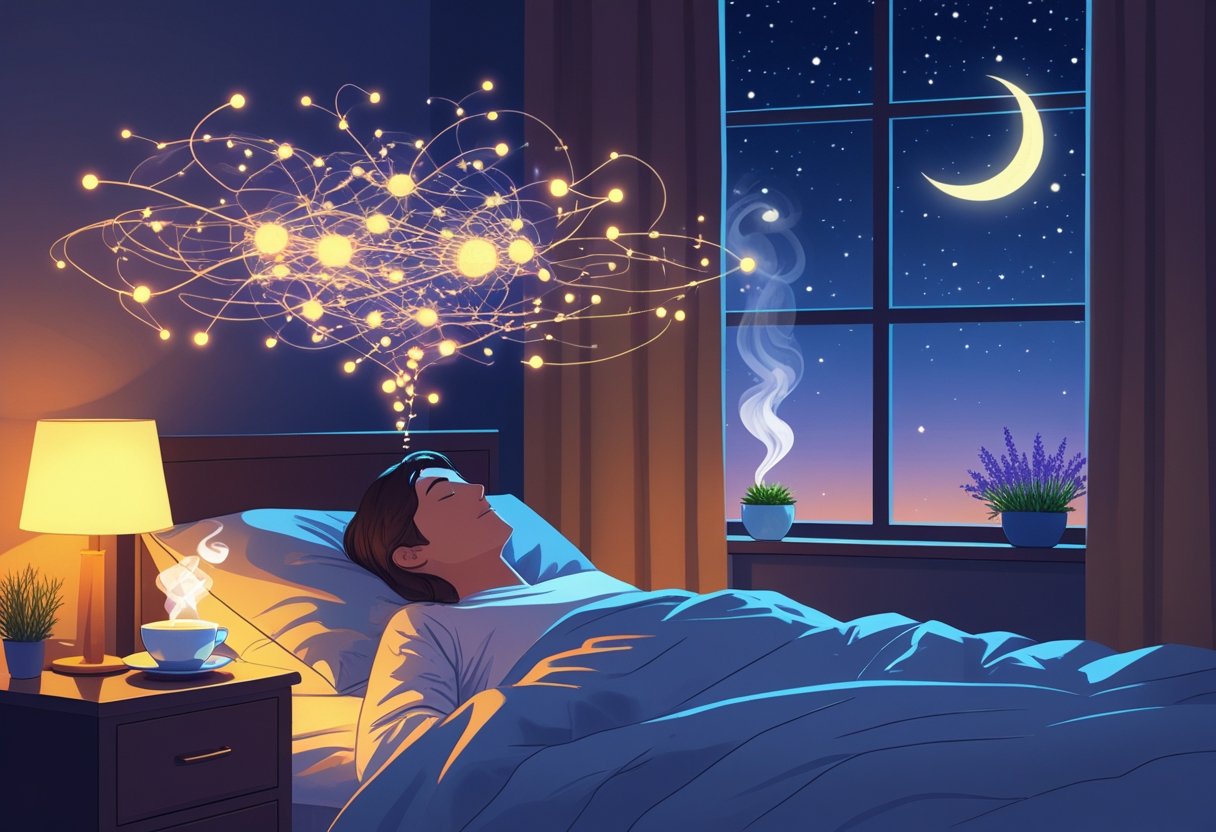Many people find it hard to fall asleep because their thoughts keep spinning the moment their head hits the pillow. Stress, daily problems, or even excitement can keep the brain active when it should be resting. Calming the mind at night can be as simple as building a relaxing routine, managing thoughts, and setting up a peaceful space. Understanding why the brain stays busy at night helps you figure out how to quiet it. Mindfulness, slow breathing, and light movement can help shift your attention away from stressful thoughts. Changing small habits, like limiting screen time or keeping a regular sleep schedule, also helps the brain settle down.
When these habits become part of your night, falling asleep gets easier. It’s not about doing everything perfectly. It’s about finding what works and sticking to it. Calming the mind before bed isn’t just good for sleep. It also supports better mood, energy, and overall health.
Key Takeaways
- Creating a calming nighttime routine tells your body it’s time to rest.
- Simple practices like mindfulness and breathing can quiet the mind.
- A peaceful sleep environment supports deep and stable rest.
- The right mattress helps your body relax and your mind stay calm, which creates the ideal environment for deep, peaceful sleep.

Understanding Why Your Mind Stays Active at Night

It’s hard to rest when your brain won’t quiet down. Some people replay the day in their heads, while others feel tense without knowing why. This happens because of mental habits, stress, or signals from the body that keep the mind alert. Understanding why your thoughts stay active can help you find ways to slow them down and rest more easily.
Causes of Racing Thoughts Before Bed
Racing thoughts can start when your brain is still busy with the day’s events. You might think about conversations, unfinished work, or problems that haven’t been solved yet. Checking the time or scrolling on your phone before bed can feed this habit. Some choices can make it worse. Bright screens at night, caffeine late in the day, or not sticking to a regular sleep schedule keep the brain awake. These behaviors stimulate your mind, which makes it harder to relax and fall asleep.
The Role of Stress and Anxiety in Sleep
Stress and anxiety trigger the body to stay alert. When this happens, your system releases hormones like cortisol. These signals tell your body to stay awake instead of slowing down for sleep. When your mind starts to worry about tomorrow or replay problems, it creates a loop that’s tough to escape. The more you think, the harder it is to rest. Learning ways to quiet your mind before bed can help ease these feelings and bring down stress levels.
Why Relaxation Is Essential for Sleep
Relaxation tells your brain it’s time to rest. Simple habits like deep breathing, gentle stretching, or guided meditation can slow your thoughts. When your body calms down, your mind follows. A peaceful space also helps. A cool, dark, and quiet room gives fewer distractions and makes it easier to settle in. These steps help shift your brain from busy thinking to a calm state that welcomes sleep.
Fundamental Mind-Calming Techniques for Falling Asleep
Calming the mind before bed takes active effort. It’s about slowing down racing thoughts and easing body tension. Simple techniques like controlled breathing, relaxing your muscles, or picturing something peaceful can help the body settle. With consistent practice, falling asleep starts to feel more natural.
Deep Breathing Exercises
Deep breathing is one of the easiest ways to relax your mind before sleeping. It tells your body to slow down by lowering your heart rate and calming stress responses. This gentle shift prepares you for rest.
A common method is diaphragmatic breathing. You breathe through your nose, letting your stomach rise while keeping your chest still. Then, you pause and slowly breathe out through pursed lips. Another simple pattern is the 4-7-8 technique: inhale for 4 seconds, hold for 7 seconds, then exhale for 8 seconds. Repeating this a few times can help quiet a restless mind and ease your body into sleep.
Progressive Muscle Relaxation
Progressive Muscle Relaxation (PMR) helps release tightness in the body. It involves gently tensing and relaxing each muscle group, usually starting at the feet and working up to the head. Each area is squeezed for about 5 seconds, then released slowly. This helps you notice where your body holds tension and teaches it to let go. When the body relaxes, the mind follows. This simple routine can ease stress and support a calmer state before bed.
Visualization and Guided Imagery
Visualization lets the mind focus on calming scenes instead of worries. It’s about creating a peaceful mental space that feels real. You can imagine a quiet beach, the sound of gentle waves, or a green forest with soft rustling leaves. Thinking about smells, textures, and sounds helps bring the scene to life. This shift in focus relaxes your thoughts and clears mental clutter, making it easier to fall asleep. It’s especially helpful for people who feel anxious or have trouble quieting their minds at night. More detailed guidance can be found on visualization methods proven to help calm your mind for sleep.

Cognitive Strategies to Quiet the Mind
Calming the mind for sleep takes a few simple mental tricks that help break racing thoughts and bring a sense of ease. These techniques shift attention away from worries and give the brain space to relax. By focusing on controlled thinking, the mind slowly learns to settle down and prepare for rest.
Cognitive Shuffling Technique
Cognitive shuffling is a way to interrupt restless thoughts by filling the mind with random, unrelated words or images. It’s like giving the brain something else to focus on so it doesn’t loop through stressful thoughts. Instead of forcing sleep, the mind gently drifts as it moves from one random idea to another. To do this, think of simple, unrelated objects like “blue teapot,” “dancing bicycle,” or “red balloon.” There’s no pattern or meaning behind it. The randomness keeps your mind from holding on to worries or replaying the day.
Many people use this technique when they want to clear their heads and fall asleep fast. It’s a simple way to break the mental noise that keeps you awake.
Mindfulness and Meditation Practices
Mindfulness helps train the brain to notice thoughts without reacting to them. When you focus on the present, like your breathing or the feeling of your body on the bed, your mind stops chasing worries. It’s not about forcing thoughts to disappear. It’s about letting them pass without holding on.
Meditation also calms the body. Slower breathing and a steady focus ease the heart rate and relax the nervous system. Even just 5 to 10 minutes each night builds a calming habit. A simple breathing pattern, like inhaling for 4 seconds, holding for 7, and exhaling for 8, can help quiet a busy mind. Over time, the brain learns that it’s safe to relax before bed.
Journaling to Clear the Mind
Writing your thoughts down before bed can ease the mental load. A quick journal session takes all those worries and tasks floating in your head and puts them on paper. Once they’re written, they feel less heavy and easier to manage. Doing this earlier in the evening helps keep those thoughts from spilling over when you lie down. It doesn’t need to be a long entry, short lists or notes are great. This small routine signals your brain that it’s time to slow down. It’s a quiet way to clear mental clutter and prepare your mind for sleep.

Optimizing Your Sleep Environment
A calm bedroom helps the body relax and get ready for rest. Controlling light, sound, and digital distractions creates a space where it’s easier to fall asleep and stay asleep. Small changes can lead to better, deeper rest.
Creating a Calm and Dark Bedroom
Darkness tells the brain it’s time to sleep. Thick curtains or blackout shades block outside light. Covering or turning off small light sources, like alarm clocks or chargers, keeps the room dark and quiet. Soft, neutral colors on the walls and bedding give the room a gentle look. Bright shades can keep the mind alert, so it’s best to avoid them. A clean and clutter-free space also creates a peaceful feeling, which can help the body relax before bed.
Managing Noise and Temperature
Noise can keep you awake or cause broken sleep. A fan or white noise machine can help cover sudden sounds. Earplugs work too if you prefer silence. Cooler air helps the body slow down. A bedroom temperature between 60 and 67°F (15–19°C) usually works best. Fans, air conditioning, or lighter blankets can help keep the room cool and comfortable through the night.
Reducing Digital Distractions Before Bed
The blue light from screens tricks the brain into thinking it’s still daytime. Turning off phones, tablets, or computers an hour before bed gives the brain time to unwind. If avoiding screens completely is hard, blue light filters or apps can help lower the effect. Doing calm activities like reading, breathing exercises, or gentle stretches can relax the mind, making it easier to drift off to sleep.

Lifestyle Habits to Support a Calm Mind

Feeling calm before bed is shaped by the habits a person builds during the day. Movement, food choices, and how they handle drinks like caffeine and alcohol all affect how quickly they drift off and how well they rest through the night.
Regular Exercise and Physical Activity
Being active helps release stress and clears the mind. Even a simple 30-minute walk or workout on most days can lift mood and ease tension. The time of day matters. It’s best to finish workouts a few hours before going to bed. Exercising right before sleep can raise energy levels and keep the mind alert when it should be slowing down. Gentle movements like yoga, stretching, or walking work well in the evening. They help the body relax and prepare for rest. A steady routine like this supports deeper, more peaceful sleep.
Healthy Eating for Better Sleep
Balanced meals help the body stay steady and the mind unwind at night. Whole foods such as vegetables, fruits, grains, and lean proteins give steady energy during the day and support rest later. Heavy meals late at night can cause discomfort or disrupt digestion. This makes it harder to relax and fall asleep. Some foods naturally help calm the body. Magnesium and tryptophan, found in nuts, seeds, and dairy, can support better sleep when eaten during the day.
Limiting Caffeine and Alcohol Intake
Caffeine keeps the brain alert, which can push sleep away. It’s best to skip coffee, tea, soda, or energy drinks at least six hours before bed. Alcohol might feel calming at first, but it interferes with the natural sleep rhythm. It can cause restless nights and early waking.
Keeping both caffeine and alcohol in check allows the mind to slow down naturally and helps the body settle into a full night of rest.
What to Think About and Not Think About to Fall Asleep

Choosing what to focus on before bed matters. The right kind of thoughts can calm the mind, while stressful ones can keep it awake. A clear and relaxed head gives the body a better chance to rest.
Positive and Neutral Thought Patterns
Thinking about calm or neutral things can help the brain slow down. It can be something as simple as remembering a quiet walk, sitting by the ocean, or watching the sunset. These images should be easy to picture and gentle on the mind.
Gratitude works well too. Remembering a kind moment during the day, like someone’s smile or a good meal, can ease tension. It reminds the brain that it’s safe to relax. Repeating a soft word or phrase, like “peace” or “breathe,” can also help. It blocks other thoughts and creates a steady rhythm that quiets the mind.
Avoiding Rumination and Worry
Worrying at night can keep the brain busy. Thinking about work, family problems, or tomorrow’s plans can make falling asleep harder. It’s better to set those thoughts aside and give the brain a break. Bedtime isn’t the right moment to solve problems. It can help to write them down earlier in the day so they don’t stay stuck in your head at night. That way, your mind won’t keep trying to fix everything when you’re supposed to rest.
Racing thoughts feed on emotion. Not reacting to them, just letting them pass, can make them lose their grip. It’s not about controlling every thought, just not letting them control you.
Safe Mental Distractions
Gentle distractions can ease the mind away from stress. Thinking about a safe, familiar place or a simple daily task, like folding clothes or watering plants, can help shift focus. Some people count backward or repeat a word to keep their thoughts steady. It’s a small mental task that doesn’t excite the brain but gives it something to do.
If your thoughts are visual, picturing plain shapes like circles or squares can help. It’s a quiet way to fill mental space without stirring up emotion. The aim is to keep the mind lightly engaged so sleep can come more easily.
How Mattresses Help Calm Your Mind for Sleep
A good mattress helps the body relax. When someone lies on a bed that supports them properly, their muscles can let go of tension. This allows the nervous system to settle, making it easier to fall asleep without feeling restless.
Mattresses that ease pressure on the body help reduce pain and keep people from moving around too much. Less movement means fewer disruptions, so the mind can stay quiet. For couples, a mattress with solid motion control keeps one person from waking the other, which helps both rest more peacefully. Temperature also matters. When a mattress stays cool, it prevents heat from building up, which can cause waking and discomfort. A cool and steady sleep environment helps the mind relax and supports a steady, peaceful night’s rest.
Good support should last. When a mattress starts to sag or wear out, it can cause pain and disrupt sleep. Consistent support helps people rest more deeply, which strengthens focus and emotional balance during the day. Some mattresses use breathable materials that regulate temperature naturally and ease stress. One example is the Brooklyn Bedding Aurora Luxe Mattress, which has cooling technology and responsive support. Its mix of comfort and airflow helps create the right setting for a calm and steady mind at night.

Frequently Asked Questions
Calming the mind before sleep starts with simple habits. Controlled breathing, light activity, and mindful food choices help the body relax. A cozy room and routine can also ease your thoughts at night.







